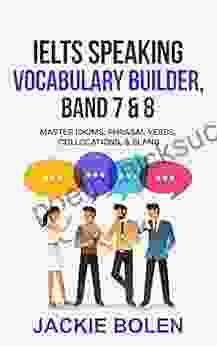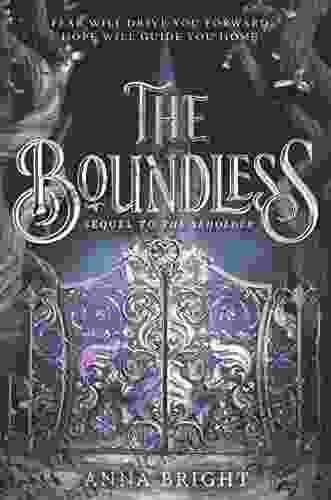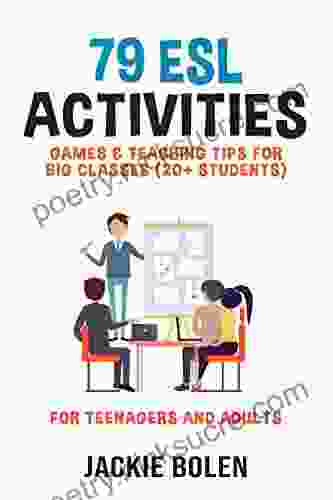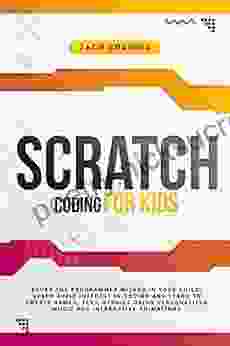Mastering Idioms, Phrasal Verbs, Collocations, and Slang for IELTS Vocabulary Builder

The International English Language Testing System (IELTS) is widely recognized as a benchmark for English proficiency. To attain a high score in IELTS, candidates need to possess a comprehensive vocabulary that includes not only common words but also more advanced language elements such as idioms, phrasal verbs, collocations, and slang.
4.1 out of 5
| Language | : | English |
| File size | : | 994 KB |
| Text-to-Speech | : | Enabled |
| Screen Reader | : | Supported |
| Enhanced typesetting | : | Enabled |
| Print length | : | 92 pages |
| Lending | : | Enabled |
This article aims to provide a comprehensive guide to these essential language elements, helping you expand your vocabulary and enhance your overall IELTS performance.
Idioms
Idioms are phrases or expressions that have a figurative meaning that cannot be understood from the literal meaning of the individual words. For example, the idiom "kick the bucket" literally means to kick a bucket, but it figuratively means to die.
Idioms are frequently used in both spoken and written English, and they add color and vividness to language. However, their figurative nature can make them challenging for non-native speakers to understand and use correctly.
To improve your understanding of idioms, try the following:
- Read widely in English, paying attention to how idioms are used in context.
- Use an idiom dictionary or online resources to look up the meaning and usage of unfamiliar idioms.
- Practice using idioms in your own speech and writing.
Phrasal Verbs
Phrasal verbs are verbs that are combined with prepositions or adverbs to create new meanings. For example, the verb "take" can be combined with the preposition "off" to create the phrasal verb "take off," which means to remove something.
Phrasal verbs are very common in English, and they can be used to express a wide range of meanings. However, they can also be confusing for non-native speakers, as the meaning of a phrasal verb cannot always be predicted from the meaning of the individual words.
To improve your understanding of phrasal verbs, try the following:
- Read widely in English, paying attention to how phrasal verbs are used in context.
- Use a phrasal verb dictionary or online resources to look up the meaning and usage of unfamiliar phrasal verbs.
- Practice using phrasal verbs in your own speech and writing.
Collocations
Collocations are groups of words that are frequently used together. For example, the words "make" and "decision" are often used together to form the collocation "make a decision."
Collocations are important because they help to make our language more fluent and natural. However, they can also be challenging for non-native speakers to learn, as they are not always logical or predictable.
To improve your understanding of collocations, try the following:
- Read widely in English, paying attention to how collocations are used in context.
- Use a collocation dictionary or online resources to look up the meaning and usage of unfamiliar collocations.
- Practice using collocations in your own speech and writing.
Slang
Slang is a type of informal language that is often used by a particular group of people. For example, the slang term "sick" is often used by young people to mean "cool" or "awesome."
Slang can be a fun and creative way to express yourself. However, it is important to use slang appropriately, as it can be confusing or offensive to people who are not familiar with it.
To improve your understanding of slang, try the following:
- Listen to music, watch movies, and read books that feature characters who use slang.
- Talk to people who use slang and ask them to explain the meaning of unfamiliar terms.
- Use online resources to look up the meaning and usage of unfamiliar slang terms.
Mastering idioms, phrasal verbs, collocations, and slang is essential for achieving a high score in IELTS. By expanding your vocabulary in these areas, you will be able to express yourself more fluently and accurately, and you will be better equipped to understand the language used in IELTS test materials.
Remember, language learning is a journey that takes time and effort. With consistent practice and dedication, you can master these essential language elements and achieve your IELTS goals.
4.1 out of 5
| Language | : | English |
| File size | : | 994 KB |
| Text-to-Speech | : | Enabled |
| Screen Reader | : | Supported |
| Enhanced typesetting | : | Enabled |
| Print length | : | 92 pages |
| Lending | : | Enabled |
Do you want to contribute by writing guest posts on this blog?
Please contact us and send us a resume of previous articles that you have written.
 Fiction
Fiction Non Fiction
Non Fiction Romance
Romance Mystery
Mystery Thriller
Thriller SciFi
SciFi Fantasy
Fantasy Horror
Horror Biography
Biography Selfhelp
Selfhelp Business
Business History
History Classics
Classics Poetry
Poetry Childrens
Childrens Young Adult
Young Adult Educational
Educational Cooking
Cooking Travel
Travel Lifestyle
Lifestyle Spirituality
Spirituality Health
Health Fitness
Fitness Technology
Technology Science
Science Arts
Arts Crafts
Crafts DIY
DIY Gardening
Gardening Petcare
Petcare Christopher T Coughlin
Christopher T Coughlin Christine Field
Christine Field Geryn Childress
Geryn Childress David Woods
David Woods Stefanie Japel
Stefanie Japel Dave Canterbury
Dave Canterbury Vittal S Anantatmula
Vittal S Anantatmula Scott Allan
Scott Allan Ray Eye
Ray Eye James P Sethna
James P Sethna Ann Zaprazny
Ann Zaprazny Bob Cary
Bob Cary Eleanor J Sullivan
Eleanor J Sullivan Ford R Bryan
Ford R Bryan Jill Lepore
Jill Lepore Cathy Glass
Cathy Glass Joy Dawson
Joy Dawson Linda Lewis Alexander
Linda Lewis Alexander Dorothy Ours
Dorothy Ours Holly Chism
Holly Chism Earl Hipp
Earl Hipp Maggie Downs
Maggie Downs Joyce Meyer
Joyce Meyer Sandy Bodeau
Sandy Bodeau Steven G Krantz
Steven G Krantz Paul Logothetis
Paul Logothetis Reinhard Kleist
Reinhard Kleist Justine Gregory Williams
Justine Gregory Williams Silvia M Lindtner
Silvia M Lindtner Creative Guy
Creative Guy Jonathan Franklin
Jonathan Franklin Ellen Painter Dollar
Ellen Painter Dollar Mark Matlock
Mark Matlock Victor Stringer
Victor Stringer Ann Valett
Ann Valett Nicholas Thomas
Nicholas Thomas Joanna Wells
Joanna Wells Tim Young
Tim Young Sally Black
Sally Black Trevor Hartman
Trevor Hartman Peter Watson
Peter Watson Peter Wacht
Peter Wacht Zena Hitz
Zena Hitz Paulo Guillobel
Paulo Guillobel Shawn Shallow
Shawn Shallow Cb Droege
Cb Droege Marva Boatman
Marva Boatman Steve Bennett
Steve Bennett Suzanne Girard Eberle
Suzanne Girard Eberle Junior Health Institute
Junior Health Institute Helen Adrienne
Helen Adrienne Prime Hall
Prime Hall John Gignilliat
John Gignilliat Angela Saini
Angela Saini Tali Sharot
Tali Sharot Ann Marie Brown
Ann Marie Brown Roy R Grinker
Roy R Grinker Mikael Lindnord
Mikael Lindnord Walter Mischel
Walter Mischel Anna Lowenhaupt Tsing
Anna Lowenhaupt Tsing Glen E Clarke
Glen E Clarke H M Schey
H M Schey Anna Bright
Anna Bright Steve Bowkett
Steve Bowkett Dan Koboldt
Dan Koboldt Gloria Chadwick
Gloria Chadwick Patricia Romanowski Bashe
Patricia Romanowski Bashe Pierluigi Barrotta
Pierluigi Barrotta Roy M Wallack
Roy M Wallack Rebecca A Moyes
Rebecca A Moyes Illysa R Foster
Illysa R Foster Tara Haelle
Tara Haelle Kalman Samuels
Kalman Samuels Janine Marsh
Janine Marsh Horace Kephart
Horace Kephart Harold Davis
Harold Davis Lily Dunn
Lily Dunn Ariel Dalfen
Ariel Dalfen Julie A Ross
Julie A Ross Robin Esrock
Robin Esrock Caroline Miller
Caroline Miller Tim Cahill
Tim Cahill Linda K Miller
Linda K Miller Les Livingstone
Les Livingstone John O Sullivan
John O Sullivan Steve Schwartz
Steve Schwartz Daniel Isberner
Daniel Isberner Helge Kragh
Helge Kragh Stacey Williams
Stacey Williams Susan M Schneider
Susan M Schneider Sandy Camillo
Sandy Camillo Nancy Marie White
Nancy Marie White Illustrated Edition Kindle Edition
Illustrated Edition Kindle Edition Bruce Lockwood
Bruce Lockwood Shannon Vallor
Shannon Vallor Thomas A Garrity
Thomas A Garrity Melanie Dickerson
Melanie Dickerson Rick Page
Rick Page Alexander L Chapman
Alexander L Chapman Suzanne I Barchers
Suzanne I Barchers Dave Whitlock
Dave Whitlock Barry Dainton
Barry Dainton Jay Allan
Jay Allan Caryl Phillips
Caryl Phillips The Pinnacle Review
The Pinnacle Review H Jerome Chapman
H Jerome Chapman Dave Hall
Dave Hall Zach Davis
Zach Davis Annalyn Ng
Annalyn Ng Julie Plagens
Julie Plagens Bernard Stiegler
Bernard Stiegler Richard C Schwartz
Richard C Schwartz Randall Fitzgerald
Randall Fitzgerald Dan Vogel
Dan Vogel Hanumant Deshmukh
Hanumant Deshmukh Livia Bitton Jackson
Livia Bitton Jackson Sharon Rowley
Sharon Rowley Shelley Emling
Shelley Emling Christine Hopfgarten
Christine Hopfgarten James C Scott
James C Scott Larry Thornberry
Larry Thornberry Nicholas Clapp
Nicholas Clapp Roger Hall
Roger Hall George Lakoff
George Lakoff Steve Olson
Steve Olson Kate Mcvaugh
Kate Mcvaugh Philip Gibson
Philip Gibson Freddy Silva
Freddy Silva Donna D Ignatavicius
Donna D Ignatavicius Scott P Sells
Scott P Sells Kathy Morey
Kathy Morey Alex Bromley
Alex Bromley Pradeepa Narayanaswamy
Pradeepa Narayanaswamy Charles J Sanders
Charles J Sanders Jackson Carter
Jackson Carter Sajni Patel
Sajni Patel Noel D Justice
Noel D Justice Zoe Moore
Zoe Moore Paul Bloom
Paul Bloom Susan Spicer
Susan Spicer Steve Oldenburg
Steve Oldenburg Jackie Bolen
Jackie Bolen Marie Cirano
Marie Cirano Jonathan R Brennan
Jonathan R Brennan Neel Doshi
Neel Doshi Julian Of Norwich
Julian Of Norwich Winton Porter
Winton Porter Heidi Kreider
Heidi Kreider Danny Jones
Danny Jones John Edwards
John Edwards Philip Reed
Philip Reed Guy Windsor
Guy Windsor Lane Demas
Lane Demas Dr Sarita Uhr
Dr Sarita Uhr John Van Wyhe
John Van Wyhe George James Grinnell
George James Grinnell Joe Hyams
Joe Hyams William P Young
William P Young Jean Barbre
Jean Barbre Henry Dillon
Henry Dillon Sean Bartram
Sean Bartram Lina Beard
Lina Beard Jennifer Dugan
Jennifer Dugan David Soucie
David Soucie Randy J Paterson
Randy J Paterson Richard A Ruth
Richard A Ruth Anna Quindlen
Anna Quindlen Matthew Rudy
Matthew Rudy Vladimir Vasiliev
Vladimir Vasiliev Seth Stephens Davidowitz
Seth Stephens Davidowitz Ichigo Takano
Ichigo Takano Chris Fregly
Chris Fregly Neal Shusterman
Neal Shusterman Timothy Ellis
Timothy Ellis Will Kurt
Will Kurt Eddie Jones
Eddie Jones Darryl Belfry
Darryl Belfry Johnny Chuong
Johnny Chuong Damian Hall
Damian Hall David Berry
David Berry Finn Aagaard
Finn Aagaard Wayne C Booth
Wayne C Booth Richard Mcafee
Richard Mcafee Peyton Curley
Peyton Curley Fox Fisher
Fox Fisher Ellen Dugan
Ellen Dugan Bert Mendelson
Bert Mendelson Tarani Chandola
Tarani Chandola Daphne Poltz
Daphne Poltz Ray Moynihan
Ray Moynihan Margaret Jean Langstaff
Margaret Jean Langstaff Joshua Shifrin
Joshua Shifrin Hannah Testa
Hannah Testa Claire Walter
Claire Walter Judy Corry
Judy Corry Curtis Collins
Curtis Collins Ben Shneiderman
Ben Shneiderman Lily Siou
Lily Siou Chris Gore
Chris Gore Worley Faver
Worley Faver Melissa Mortenson
Melissa Mortenson Stephanie Cave
Stephanie Cave Katie Krimer Ma Lcsw
Katie Krimer Ma Lcsw Tanmay Mehta
Tanmay Mehta Anna Flores Locke
Anna Flores Locke Tyler Richards
Tyler Richards Jemar Tisby
Jemar Tisby Genevieve Mckay
Genevieve Mckay L J Smith
L J Smith Louise Katz
Louise Katz Chronicle Books
Chronicle Books Sherry B Ortner
Sherry B Ortner Hill Harper
Hill Harper Bella Forrest
Bella Forrest Tony Osgood
Tony Osgood Christopher Seddon
Christopher Seddon G Norman Lippert
G Norman Lippert Harnarayan Singh
Harnarayan Singh Isaac Fitzsimons
Isaac Fitzsimons Howard Means
Howard Means Jessa Stone
Jessa Stone Richard A Swanson
Richard A Swanson Suzanne Clark
Suzanne Clark James Burke
James Burke Jenny Jacobs
Jenny Jacobs Steven Munatones
Steven Munatones Ann Voskamp
Ann Voskamp Steven Yellin
Steven Yellin Stefan Hollos
Stefan Hollos Nisha Garg
Nisha Garg Charles Dickens
Charles Dickens Katharine Beals
Katharine Beals Steve Newell
Steve Newell Karen Bassie Sweet
Karen Bassie Sweet Susan G Solomon
Susan G Solomon Jonathan Pd Buckley
Jonathan Pd Buckley Dannah Gresh
Dannah Gresh William Goldman
William Goldman Sara Dyer
Sara Dyer Lisa Randall
Lisa Randall Bob Labbe
Bob Labbe Margaret Rogerson
Margaret Rogerson Ralph Waldo Emerson
Ralph Waldo Emerson John Baichtal
John Baichtal Josephine Mccarthy
Josephine Mccarthy Larry Semento
Larry Semento Kristina Cowan
Kristina Cowan Boye Lafayette De Mente
Boye Lafayette De Mente John Dunn
John Dunn Jenn Bennett
Jenn Bennett Zach Codings
Zach Codings Ralph Cockburn
Ralph Cockburn Sukhveer Singh
Sukhveer Singh Mark Mckinney
Mark Mckinney Adele Faber
Adele Faber Breeda Bermingham
Breeda Bermingham W W Sawyer
W W Sawyer Monroe Wildrose
Monroe Wildrose Annabel Streets
Annabel Streets James F Twyman
James F Twyman Jacqueline Winslow
Jacqueline Winslow Craig Ramsay
Craig Ramsay Lizzie Collingham
Lizzie Collingham Charlene Beswick
Charlene Beswick Anna Ivey
Anna Ivey Susan Straub
Susan Straub Chic Scott
Chic Scott Anna Della Subin
Anna Della Subin Maya Van Wagenen
Maya Van Wagenen L J Martin
L J Martin Oskar Morgenstern
Oskar Morgenstern Mary E Pearson
Mary E Pearson Arcturus Publishing
Arcturus Publishing Gilbert J Grant Md
Gilbert J Grant Md Adil E Shamoo
Adil E Shamoo Laurie Varga
Laurie Varga Robby Weber
Robby Weber Dean Buonomano
Dean Buonomano Dr Harper
Dr Harper Steven Callahan
Steven Callahan Barb Musick
Barb Musick Julie C Meloni
Julie C Meloni Anna Grafl
Anna Grafl Miley Smiley
Miley Smiley Steve Grant
Steve Grant Patrick Torsell
Patrick Torsell Barry Schwartz
Barry Schwartz Sheela Raja
Sheela Raja Good Books
Good Books Omari Bouknight
Omari Bouknight Antonio Robert
Antonio Robert Mordecai Orimiladeye
Mordecai Orimiladeye Melvin Fitting
Melvin Fitting Sarah Stodola
Sarah Stodola Jack Perconte
Jack Perconte John Dickson
John Dickson Todd Radom
Todd Radom Lisa Manterfield
Lisa Manterfield Douglas Perry
Douglas Perry R K Agarwal
R K Agarwal Sally Annjanece Stevens
Sally Annjanece Stevens John Pullen
John Pullen Peter Hathaway Capstick
Peter Hathaway Capstick Eric Greitens
Eric Greitens Elisabeth Haich
Elisabeth Haich Christina Henry De Tessan
Christina Henry De Tessan R A Salvatore
R A Salvatore J Scott Long
J Scott Long Kristen L Mauk
Kristen L Mauk Nelson Dellis
Nelson Dellis Robert Gerver
Robert Gerver Scott Shupe
Scott Shupe Margaret Paul
Margaret Paul Emmett W Hines
Emmett W Hines Anne Sylvie Malbrancke
Anne Sylvie Malbrancke John Murray
John Murray Sparknotes
Sparknotes Ling Seto
Ling Seto Gemma Bray
Gemma Bray Jennifer Kostick
Jennifer Kostick Bob Madgic
Bob Madgic Helen E Lees
Helen E Lees Richard Appleton
Richard Appleton Jacob Ward
Jacob Ward Anna Watson
Anna Watson Stuart Tomlinson
Stuart Tomlinson Sean Covey
Sean Covey Jenna Evans Welch
Jenna Evans Welch Gary Chapman
Gary Chapman Robert A Conover
Robert A Conover Julia Galef
Julia Galef Jay Spence
Jay Spence Anna Wood
Anna Wood Michael G Manning
Michael G Manning Asker Jeukendrup
Asker Jeukendrup Jennifer L Lopez
Jennifer L Lopez Valerie Hansen
Valerie Hansen Todd Denault
Todd Denault Clive Scarff
Clive Scarff Horace Freeland Judson
Horace Freeland Judson Becky Wade
Becky Wade Michael Hodgson
Michael Hodgson Hope Comerford
Hope Comerford C J Brown
C J Brown Dave Hughes
Dave Hughes Kyung Won Chung
Kyung Won Chung Fumio Sasaki
Fumio Sasaki Martin Meredith
Martin Meredith Quinn Loftis
Quinn Loftis Chase Hassen
Chase Hassen Peter L Falkingham
Peter L Falkingham Michael Tan
Michael Tan Jason
Jason Aaron Mahnke
Aaron Mahnke Wendy Leo Smith
Wendy Leo Smith Kristian Berg
Kristian Berg Kendall Coyne
Kendall Coyne Christelle Dabos
Christelle Dabos Annette Burns
Annette Burns Ruby Mcconnell
Ruby Mcconnell James C Zimring
James C Zimring Bren Smith
Bren Smith Kass Morgan
Kass Morgan Rebecca Carroll
Rebecca Carroll J E Esslemont
J E Esslemont Emily J Taylor
Emily J Taylor Sally Connolly
Sally Connolly M Shawn Copeland
M Shawn Copeland Michael F Nenes
Michael F Nenes Gill James
Gill James Anna B Doe
Anna B Doe John Yates
John Yates Graham Robb
Graham Robb Morton Manus
Morton Manus Dana James
Dana James Carl Mckeating
Carl Mckeating Sam Demas
Sam Demas Frank Thomas
Frank Thomas Lori L Tharps
Lori L Tharps Martin N Seif
Martin N Seif Dante Fortson
Dante Fortson Ian Moulding
Ian Moulding Stephen Tarsitano
Stephen Tarsitano Matthew Locricchio
Matthew Locricchio Dan Gardner
Dan Gardner Sharman Apt Russell
Sharman Apt Russell Sean Purchase
Sean Purchase Zach Hunter
Zach Hunter Frances Schultz
Frances Schultz Robert A Cook
Robert A Cook Ann Mccallum Staats
Ann Mccallum Staats Gwen Mckee
Gwen Mckee Mike Roberts
Mike Roberts Crystal Cook
Crystal Cook Mishka Shubaly
Mishka Shubaly Joey Myers
Joey Myers Matthew Cobb
Matthew Cobb Peter Richmond
Peter Richmond Michael Burnett
Michael Burnett Julian Havil
Julian Havil Buddy Lee
Buddy Lee Stan Gibilisco
Stan Gibilisco Barak A Bassman
Barak A Bassman Marjorie Savage
Marjorie Savage P M Gilbert
P M Gilbert Anna Crowley Redding
Anna Crowley Redding Jeff Kuehl
Jeff Kuehl Mike Reilly
Mike Reilly Holly Bourne
Holly Bourne L Chapman
L Chapman Cade Courtley
Cade Courtley Skeleton Steve
Skeleton Steve Stephen J Pyne
Stephen J Pyne Pawel Malczewski
Pawel Malczewski Elizabeth Wissner Gross
Elizabeth Wissner Gross Ken Robinson
Ken Robinson E R Truitt
E R Truitt Krista Marson
Krista Marson C W Farnsworth
C W Farnsworth Darcie Little Badger
Darcie Little Badger Naomi Tomky
Naomi Tomky Chris Bailey
Chris Bailey Malcolm S Thaler
Malcolm S Thaler L A Cotton
L A Cotton Patricia Ladis
Patricia Ladis Stacey A Shannon
Stacey A Shannon Barbara Sealock
Barbara Sealock Jay Young
Jay Young Bethany Saltman
Bethany Saltman M Terese Verklan
M Terese Verklan Geoff Greig
Geoff Greig Paul Mendelson
Paul Mendelson Timothy P Schultz
Timothy P Schultz Rutger Bregman
Rutger Bregman Michael Witwer
Michael Witwer Rick Sparkman
Rick Sparkman College Hippo
College Hippo Robert F Boszhardt
Robert F Boszhardt June Hur
June Hur Louis Van Dyke
Louis Van Dyke Sara Wickham
Sara Wickham Michael Labossiere
Michael Labossiere Harley Mcallister
Harley Mcallister Luke Schumacher
Luke Schumacher Brian Daccord
Brian Daccord Julie Creffield
Julie Creffield Annaka Harris
Annaka Harris Steven A Fino
Steven A Fino Kennedy Achille
Kennedy Achille Lexi Ryan
Lexi Ryan
Light bulbAdvertise smarter! Our strategic ad space ensures maximum exposure. Reserve your spot today!

 John GrishamOne Ordinary Girl, One Life-Changing Condition: How Tourette's Changes Your...
John GrishamOne Ordinary Girl, One Life-Changing Condition: How Tourette's Changes Your...
 Holden BellWould You Give Up Everything to Sail Across the Ocean with a Man You Barely...
Holden BellWould You Give Up Everything to Sail Across the Ocean with a Man You Barely...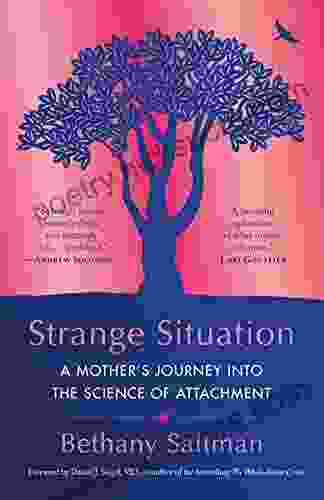
 Colin FosterMother's Journey Into the Science of Attachment: Understanding the Profound...
Colin FosterMother's Journey Into the Science of Attachment: Understanding the Profound...
 E.E. CummingsHarley Merlin and the Broken Spell: An Enchanting Tale of Magic and Adventure
E.E. CummingsHarley Merlin and the Broken Spell: An Enchanting Tale of Magic and Adventure Devin CoxFollow ·15k
Devin CoxFollow ·15k Boris PasternakFollow ·15.4k
Boris PasternakFollow ·15.4k Miguel NelsonFollow ·19.3k
Miguel NelsonFollow ·19.3k Dylan MitchellFollow ·8.5k
Dylan MitchellFollow ·8.5k Colt SimmonsFollow ·17.9k
Colt SimmonsFollow ·17.9k Dwayne MitchellFollow ·2.5k
Dwayne MitchellFollow ·2.5k Jessie CoxFollow ·8.3k
Jessie CoxFollow ·8.3k Julian PowellFollow ·6.5k
Julian PowellFollow ·6.5k

 Aldous Huxley
Aldous HuxleyMorgenstern: A Classic Tale of True Love and High...
Morgenstern is a...
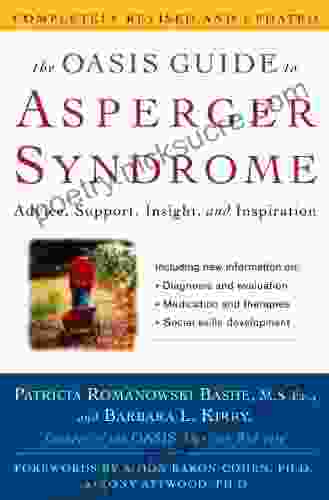
 Beau Carter
Beau CarterThe Oasis Guide to Asperger Syndrome
What is Asperger Syndrome? Asperger...
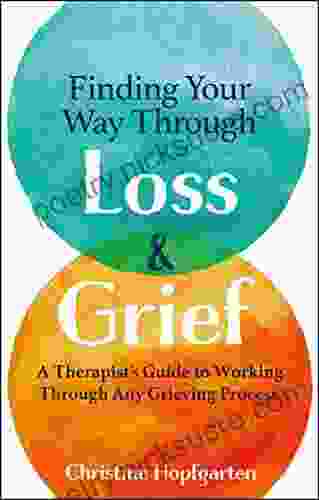
 Chadwick Powell
Chadwick PowellFinding Your Way Through Loss Grief: A Therapist S Guide...
Grief is a natural human emotion that we...
4.1 out of 5
| Language | : | English |
| File size | : | 994 KB |
| Text-to-Speech | : | Enabled |
| Screen Reader | : | Supported |
| Enhanced typesetting | : | Enabled |
| Print length | : | 92 pages |
| Lending | : | Enabled |


